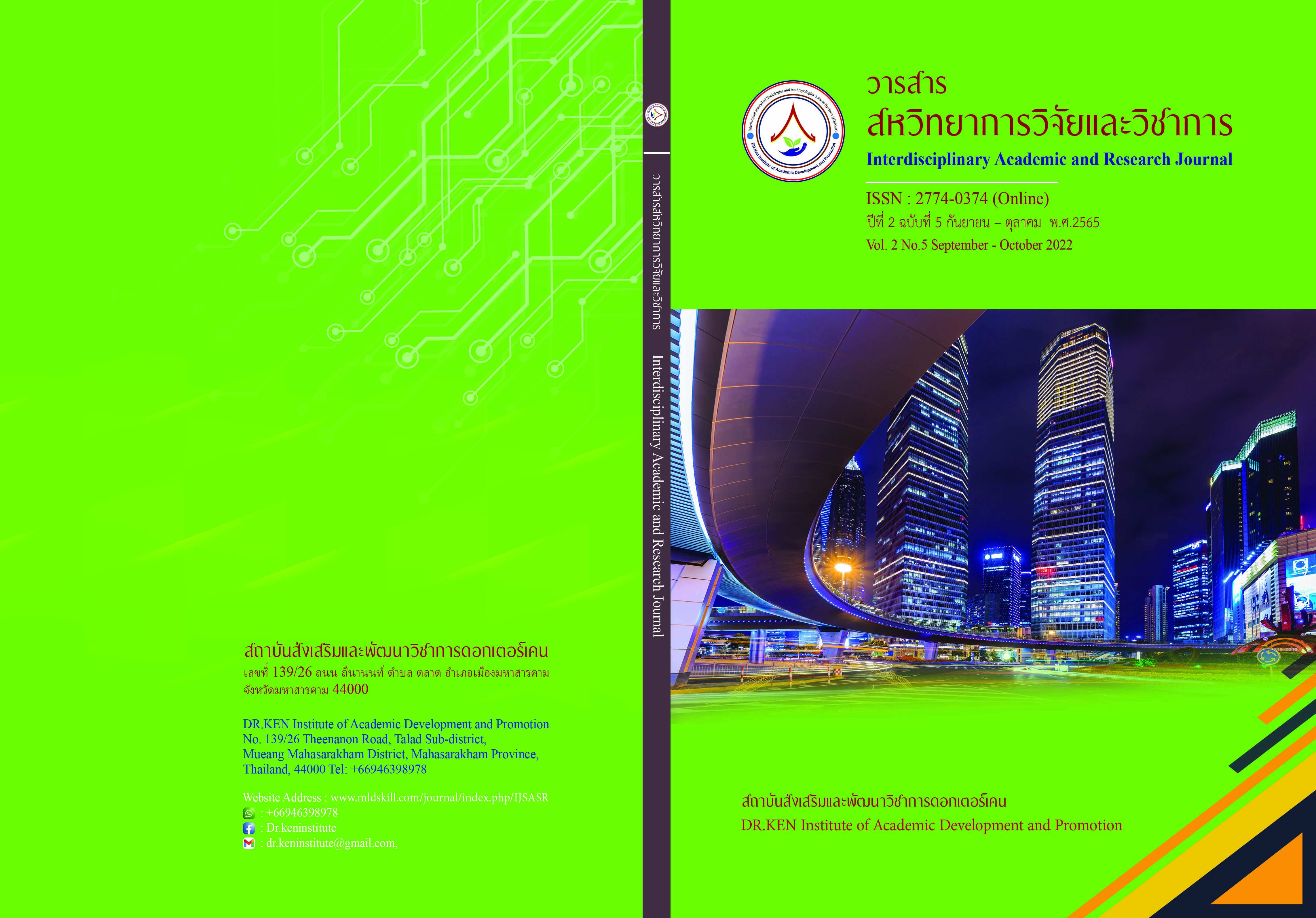The Development of Participatory Management Model for Developing the Student’s Life Skill in Kuchinarai School, Kalasin Province
DOI:
https://doi.org/10.14456/iarj.2022.101Keywords:
Development; , Model; , Participatory Management; , Life SkillsAbstract
Life skills are the ability to adapt to behavior in a way that enables a person to effectively deal with the needs and stimuli of everyday life. It is one of the number’s essential skills in the 21st century categorized in the Life and Work Skills category. Thus, the purposes of this research were to find: (1) Study the Essential needs to develop students’ important competence. (2) Study the present conditions of participatory management for students’ life skills. (3) Develop the model of participatory management for life skill development. (4) Implement the model of participatory management for life skill development. And (5) Estimate the model of participatory management for life skill development. The research is a research & development method. The research procedure consisted of 5 phases. Collecting data by exploratory, questionnaire, and interview. The data were analyzed by using basic statistics, mean and standard deviation, and a t-test. The research finding was as follow. (1) The needed assessment of the first part of developing a student’s important competence is the ability to use life skills. (2) The current condition of the participatory management development of life skills was at a medium. (3) The model the participatory management for life skill development consists of the board of executive committee, Scope of activities, and Management process for life skills development. (4) The experimental result of participatory management for life skill development. There are 3 results were found that the participatory management development for Developing the Student’s Life Skill and the process were at a high level, the mean was at 3.93 which was higher than before the experiment, and the use of the model of statistical significance was at a level. After the experiment, the results of participatory management for life skills were at a high level, the mean was 4.42 which was higher than the before experiment at 0.5. And (5) The result of participative management for developing life skills, found that the process was at the highest level, mean was at 4.58, and all of 4 parts, mean was at highest, which sort in descending order are a possibility, suitability, accuracy, and usefulness.
References
คณะสังคมศาสตร์ มหาวิทยาลัยเกษตรศาสตร์. (2564). รายงานการพัฒนาเด็กและเยาวชน ประจำปี 2563. กรุงเทพฯ : คณะสังคมศาสตร์ มหาวิทยาลัยเกษตรศาสตร์.
ชวัลวิทย์ จินดา. (2560). การวิจัยเชิงบูรณาการแบบองค์รวมเพื่อพัฒนาทักษะชีวิตของนักเรียนชั้นมัธยมศึกษาตอนปลาย. วิทยานิพนธ์ปริญญาปรัชญาดุษฎีบัณฑิต : มหาวิทยาลัยบูรพา.
ธนัตถ์การต์ ศรีเฉลี่ยว. (2560). การพัฒนาทักษะชีวิตของนักเรียนชั้นมัธยมศึกษาปีที่ 4-6 โดยการใช้การวิจัย ปฏิบัติการแบบมีส่วนร่วม. วารสารบัณฑิตศึกษา มหาวิทยาลัยราชภัฏวไลยอลงกรณ์ ในพระบรม ราชูปถัมภ์. 11 (2), 61-74.
บุญไชย สิงห์มหาไชย. (2565). การพัฒนารูปแบบการบริหารแบบมีส่วนร่วมของครูและบุคลากรในการจัดการเรียนรู้เพื่อส่งเสริมทักษะชีวิตและอาชีพ โรงเรียนสวนป่าเขาชะอางค์. [Online]. https://www.kroobannok.com/board_view.php?b_id=185100&bcat_id=16&fbclid=IwAR1Mck6fJd-9g4CIBr4Pmok0ZI65x-wYk95wO1KtzsbhSs9HRwWzb2d9P9w [20 กันยายน 2565].
ประภัสสร บุญบำเรอ, จำนง วงษ์ชาชม, วัลนิกา ฉลากบาง และ ทนงศักดิ์ คุ้มไข่น้ำ. (2560). การพัฒนารูปแบบการบริหารแบบมีส่วนร่วมของคณะกรรมการบริหาร โรงเรียนเอกชนในภาคตะวันออกเฉียงเหนือ. วารสารมหาวิทยาลัยนครพนม. 7 (2), 27-35.
รมณภัทร กตตน์วงศกร. (2557). การศึกษาผลการพัฒนาทักษะชีวิตของนักเรียนชั้นประถมศึกษาปีที่ 6 โรงเรียนบางจาก (โกมลประเสริฐอุทิศ) สำนักงานเขตภาษีเจริญ กรุงเทพมหานคร. สารนิพนธ์ปริญญาการศึกษามหาบัณฑิต : มหาวิทยาลัยศรีนครินทรวิโรฒ.
รมย์นลิน ศรีสายหยุด, เสาวนีย์ สิกขาบัณฑิต, และปัญญา ธีระวิทยเลิศ. (2564). รูปแบบการบริหารแบบมีส่วนร่วมในการจัดการอาชีวศึกษาระบบทวิภาคีของสถาบันการอาชีวศึกษาภาคกลาง 3. วารสาร มจร พุทธปัญญาปริทรรศน์, 7 (1), 89-104.
แววศิริ วิวัจนสิรินทร์. (2557). “การพัฒนารูปแบบการบริหารงานวิชาการแบบมีส่วนร่วมที่ใช้โรงเรียนเป็นฐานในสถานศึกษาขั้นพื้นฐาน สังกัดกรุงเทพมหานคร”. วารสารวิชาการมหาวิทยาลัยอีสเทิร์นเอเชีย. 3 (1), 91-102.
สำนักงานคณะกรรมการการศึกษาขั้นพื้นฐาน. (2554). การพัฒนาทักษะชีวิตในระบบการศึกษาขั้นพื้นฐาน. กรุงเทพฯ : โรงพิมพ์ชุมนุมสหกรณ์การเกษตรแห่งประเทศไทย.
สำนักงานคณะกรรมการการศึกษาแห่งชาติ. (2553). พระราชบัญญัติการศึกษาแห่งชาติ พุทธศักราช 2542 แก้ไขเพิ่มเติม (ฉบับที่ 2) พุทธศักราช 2545 และแก้ไขเพิ่มเติม (ฉบับที่ 3) พุทธศักราช 2553. กรุงเทพฯ : พริกหวานกราฟฟิค.
สำนักงานคณะกรรมการพัฒนาการเศรษฐกิจและสังคมแห่งชาติ. (2560). ยุทธศาสตร์ชาติ 20 ปี พ.ศ. 2561 - 2580. กรุงเทพฯ : สำนักงานเลขานุการของคณะกรรมการยุทธศาสตร์ชาติ.
สำนักงานเลขาธิการสภาการศึกษา. (2560). แผนการศึกษาแห่งชาติพ.ศ. 2560 – 2579. พิมพ์ครั้งที่ 2.กรุงเทพฯ : สำนักงานเลขาธิการสภาการศึกษา กระทรวงศึกษาธิการ.
สุนันทวิทย์ พลอยขาว. (2557). การพัฒนารูปแบบการบริหารการจัดการเรียนการสอนแบบมีส่วนร่วมระดับมัธยมศึกษาตอนปลาย. วิทยานิพนธ์ปริญญาปรัชญาดุษฎีบัณฑิต : มหาวิทยาลัยนอร์ทกรุงเทพ.
Krejcie, R. V. & Morgan, D. W. (1970). Determining Sample Size for Research Activities. Educational and Psychological Measurement. 30 (3), 607-610.
World Health Organization. (1994). Life Skill Education in School. Geneva: World Health Organization.
Downloads
Published
How to Cite
Issue
Section
License
Copyright (c) 2022 ประพันธ์ศักดิ์ ภูศรีฐาน

This work is licensed under a Creative Commons Attribution-NonCommercial-NoDerivatives 4.0 International License.
Copyright on any article in the Interdisciplinary Academic and Research Journal is retained by the author(s) under the under the Creative Commons Attribution-NonCommercial-NoDerivatives 4.0 International License. Permission to use text, content, images, etc. of publication. Any user to read, download, copy, distribute, print, search, or link to the full texts of articles, crawl them for indexing, pass them as data to software, or use them for any other lawful purpose. But do not use it for commercial use or with the intent to benefit any business.
















.png)


